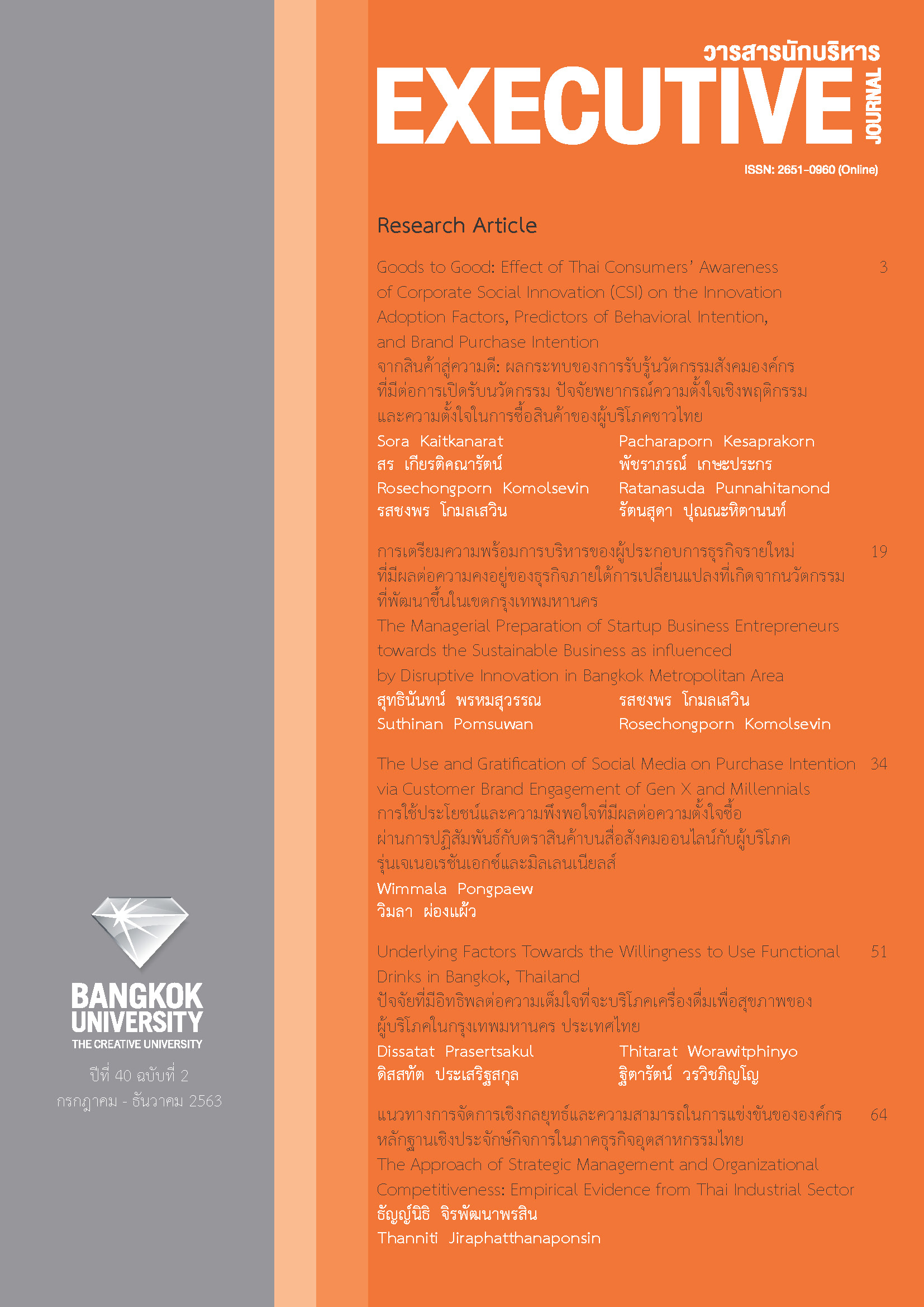Underlying Factors Towards the Willingness to Use Functional Drinks in Bangkok, Thailand
Main Article Content
Abstract
There has been a greater health concern among people around the world in the past several years. This results in an increasing demand of functional foods and drinks. Despite this demand’s growth, there is still a controversy among scholars in such a research stream with regards to the factors affecting consumers’ willingness to use functional foods and drinks. The major objective of this research is to examine the factors influencing consumers’ willingness to use functional drinks in Bangkok, Thailand. The model of this study was developed from synthesizing the models used in the previous relevant research studies. There were four independent constructs being proposed in the ‘Functional Drinks Acceptance’ model. A structured questionnaire was used to collect the data from 403 respondents using multi-stage sampling undertaken at major public areas in Bangkok. Structural Equation Modelling (SEM) was employed to test hypotheses in the model through AMOS 23.0. Most hypotheses were statistically significant and supported. Consumers’ attitude towards functional drinks, products’ health claimed, and credibility of information source had a significant influence on the willingness to use functional drinks; whilst consumers’ health concern showed insignificant results. This research benefits both food and beverage companies and nutritionists to help them develop the right functional drinks for Thai consumers.
Article Details
The manuscript submitted for publication must be the original version, submitted only to this particular journal with no prior acceptance for publication elsewhere in other academic journals. The manuscript must also not violate the copyright issue by means of plagiarism.
References
Ares, G., Giménez, A., & Gámbaro, A. (2008). Influence of nutritional knowledge on perceived healthiness and willingness to try functional foods. Appetite, 51(3), 663–668.
Bech-Larsen, T., & Grunert, K. G. (2003). The perceived healthiness of functional foods-A conjoint study of Danish, Finnish and American consumers’ perception of functional foods. Appetite, 40(1), 9–14.
Benkouider, C. (2005). Functional foods: A Global overview. International Food Ingredients, 5, 66–68.
Bhaskaran, S., & Hardley, F. (2002). Buyer beliefs, attitudes and behavior: Foods with therapeutic claims. Journal of Consumer Marketing, 19(7), 591-606.
Bower, J. A., Saadat, M. A., & Whitten, C. (2003). Effect of liking, information and consumer characteristics on purchase intention and willingness to pay more for a fat spread with a proven health benefit. Food Quality and Preference, 14(1), 65-74.
Fornell, C., & Larcker, D. F. (1981). Evaluating structural equation models with unobservable variables and measurement error. Journal of Marketing Research, 18(1), 39-50.
Hair, J. F., Babin, B. J., Anderson, R. E., & Black, W. C. (2018). Multivariate data analysis (8th ed.). London, UK: Cengage Learning EMEA.
Hair, J. F., Black, W. C., Babin, B. J., & Anderson, R. E. (2010). Multivariate data analysis (7th ed.). Upper Saddle River, NJ: Prentice Hall.
Hsu, C. L., Yu, L. C., & Chang, K. C. (2017). Exploring the effects of online consumer reviews, regulatory focus, and product type on purchase intention: Perceived justice as moderator. Computers in Human Behavior, 69, 335-346.
Kline, R. B. (2011). Principles and practice of structural equation modeling (3rd ed.). New York: The Guilford Press.
Kraus, A. (2015). Development of functional food with the participation of the consumer. Motivators for consumption of functional products. International Journal of Consumer Studies, 39(1), 2-11. https://doi.org/10.1111/ijcs.12144
Krystallisa, A., Maglarasb, G., & Mamalisc, S. (2008). Motivations and cognitive structures of consumers in their purchasing of functional foods. Food Quality and Preference, 19(6), 525-538.
Landström, E., Hursti, U-K. K., & Magnusson, M. (2009). Functional foods compensate for an unhealthy lifestyle: Some Swedish consumers ‘impressions and perceived need of functional foods. Appetite, 53(1), 34-43.
Lyly, M., Roininen, K., Honkapää, K., & Poutanen, K. (2007). Factors influencing consumers’ willingness to use beverages and ready-to-eat frozen soups containing oat ß-glucan in Finland, France and Sweden. Food Quality and Preference, 18(2), 242-255.
Malhotra A., Schuler S. R., & Boender C. (2002). Measuring women’s empowerment as a variable in international development. Washington, DC: World Bank.
O’Connor, E. L., & White, K. M. (2010). Willingness to trial functional foods and vitamin supplements: The role of attitudes, subjective norms, and dread of risks. Food Quality and Preference, 21(1), 75–81.
Phuong, N. N. D., & Dat, N. T. (2017). The effect of country-of-origin on customer purchase intention: A study of functional products in Vietnam. Journal of Asian Finance, Economics and Business, 4(3), 75-83.
Plasek, B., & Temesi, A. (2019). The credibility of the effects of functional food products and consumers’ willingness to purchase/willingness to pay. Appetite, 143, https://doi.org/10.1016/j.appet.2019.104398
Rezai, G., Teng, P. K., Shamsudin, M. N., Mohamed, Z., & Stanton, J. L. (2017). Effect of perceptual differences on consumer purchase intention of natural functional food. Journal of Agribusiness in Developing and Emerging Economies, 7(2), 153-173.
Rupprecht, C. D. D., Fujiyoshi, L., McGreevy, S. R., & Tayasu, I. (2020). Trust me? Consumer trust in expert information on food product labels. Food and Chemical Toxicology, 137, https://doi.org/10.1016/j.fct.2020.111170
Siró, I., Kápolna, E., Kápolna, B., & Lugasi, A. (2008). Functional food: Product development, marketing and consumer acceptance – A review. Appetite, 51(3), 456-467.
Sloan, A. E. (2000). The top ten functional food trends. Food Technology, 54(4), 33–62.
Szwacka-Mokrzychka, J., & Kociszewski, M. (2019). Directions of functional food market development in light of new consumer trends. Acta Scientiarum Polonorum – Oeconomia, 18(4), 103-111. https://doi.org/10.22630/ASPE.2019.18.4.50
Temesi, A., Bacsó, A., Grunert, K. G., & Lakner, Z. (2019). Perceived correspondence of health effects as a new determinant influencing purchase intention for functional food. Nutrients, 11(4), 740. https://doi.org/10.3390/nu11040740
The Nielsen Company (Thailand) Limited. (2019). Quarter by numbers: Q4 2018. Retrieved November 20, 2019, from https://www.nielsen.com/th/th/insights/report/2019/global-qbn-q4-2018/
Tuorila, H., & Cardello, A. V. (2002). Consumer response to an off- flavour in juice in the presence of specific health claims. Food Quality and Preference, 13(7), 561-569.
Urala, N. (2005). Functional foods in Finland consumers’ views, attitudes and willingness to use. Finland: VTT Publications.
Urala, N., & Lähteenmäki, L. (2004). Attitudes behind consumers’ willingness to use functional foods. Food Quality and Preference, 15(7), 793-803.


